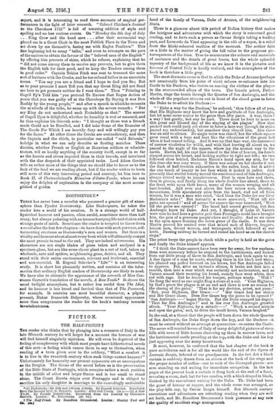DOSTOIEVSKY..
fircens has never been a novelist who possessed a greater gift of atmo- sphere than Fyodor Dosteievsky. Like Shakespeare, he takes the reader into a world of his creation. It is a strange world of half. hystericalhumour and passion, often sordid, sometimes more than half crazy, but always pulsating with an intense hurrying life and shaken with strange gusts of mirth. Sometimes the reader is tempted to throw down a novel after the first few chapters—to have done with such perverse, self. tormenting creatures as Dostoievsky's men and women. But there is a vitality and humour about almost every book which will ultimately compel the most prosaic to read to the end. They are indeed microcosms. His characters are not single blades of grass taken and analysed in a specimen-glass, but are like some clover plant in a cut of turf, taken up wholesale, ants and spiders', neighbouring grass, daisies, and all. They stand with their entire environment, relevant and irrelevant, essential &lad non-essential. M. Eugenii Soloviev's "Life "I is an interesting study. It is short but pleasantly written, and contains all the infor- mation that ordinary English readers of Dostoievsky are likely to need. We have 'also to chronicle the appearance of the seventh of Miss Con. stance Gannett's translation of the novels, A Baty Youth.2 It shows the usual twilight atmosphere, but is rather less sordid than The Idiot, and its humour is leas broad and farcical than that of The Possessed, for example. It contains one most beautiful character, a pilgrim peasant, Mslair Ivanovich Dolgoruky, whose occasional appearance more than compensates the reader for the book's tendency towards invertebratenesa.


























 Previous page
Previous page